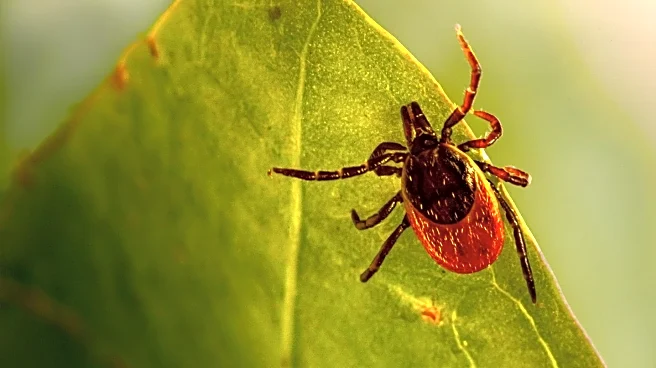What's Happening?
Residents of Islesboro, a Maine island, are experiencing increasing rates of tick-borne diseases, including babesiosis and anaplasmosis. These diseases are transmitted by ticks and can lead to severe health issues such as anemia and organ failure. The island has historically had high rates of Lyme disease, and the prevalence of new tick-borne illnesses is causing concern among the community. Efforts to manage the deer population, which serves as hosts for ticks, have been met with mixed reactions. While some residents advocate for deer culling to reduce disease transmission, others prefer educational and preventive measures. The island's health center has been proactive in raising awareness and providing treatment, but the community remains divided on the best approach to tackle the issue.
Why It's Important?
The rise in tick-borne diseases on Islesboro highlights the broader public health challenge posed by these infections, which are becoming more common in various parts of the U.S. As climate change affects tick populations and their habitats, more communities may face similar threats. The situation underscores the need for effective public health strategies, including education, prevention, and possibly wildlife management, to mitigate the risks. The economic impact is also significant, as healthcare costs rise and outdoor activities become restricted, affecting tourism and local businesses. The debate over deer culling reflects the complex balance between ecological management and public health priorities.
What's Next?
Islesboro residents and health officials are likely to continue discussions on the best strategies to manage tick-borne diseases. The potential introduction of new diseases, such as the Powassan virus, may prompt further action. The community may explore additional preventive measures, such as expanding educational programs and improving rapid testing capabilities. The development of vaccines for Lyme disease and other tick-borne illnesses could offer long-term solutions. Stakeholders, including local government and health organizations, will need to collaborate to address the ongoing challenges and protect public health.
Beyond the Headlines
The situation on Islesboro raises ethical and cultural questions about wildlife management and human interaction with nature. The decision to cull deer populations involves weighing ecological impacts against health benefits, reflecting broader debates on conservation and public health. The community's response to tick-borne diseases also highlights the importance of resilience and adaptation in the face of environmental changes. As tick populations expand due to milder winters, similar challenges may arise in other regions, prompting a reevaluation of outdoor lifestyle practices and health precautions.









